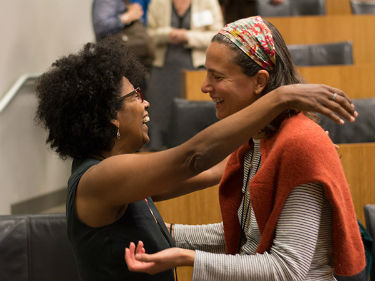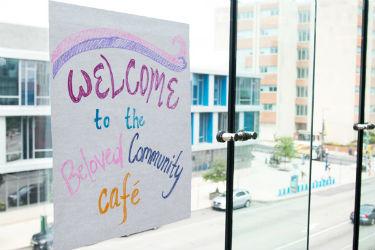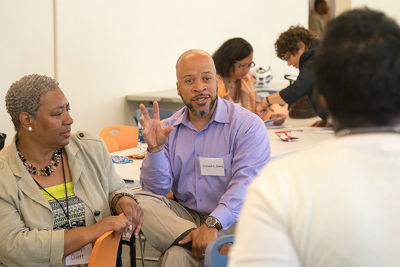The law school hosted the 2nd Annual Conference of the Project for Integrating Spirituality, Law and Politics from June 3 to 5.
The conference attracted attorneys, legal educators, religious leaders and community activists who aim to reform the justice system through transformative social change that heals broken relationships and uses the law to foster empathy and compassion in the arena of criminal justice and beyond.
Part of a movement to integrate seemingly disparate forces, the event explored ways for lawyers, activists and educators to “bring our whole selves to the work of social change,” said Professor Susan Brooks, the associate dean for experiential learning and lead organizer of the conference.
“We are in a climate of extremism that calls upon us to figure out how we can move in this direction of ‘Beloved Community,’” Brooks said, invoking the objective underlying the late Rev. Martin Luther King’s quest for nonviolent social change.
 In the workshop, “The Courtroom as an Arena of Moral Opportunity,” Judge Maria Arias of the Family Court in Brooklyn, N.Y. and Judge Edwina Richardson-Mendelson of the New York City Family Court discussed the fragile but powerful opportunities to infuse empathy, mercy and mindfulness into proceedings to make the courtroom a less adversarial place for troubled families.
In the workshop, “The Courtroom as an Arena of Moral Opportunity,” Judge Maria Arias of the Family Court in Brooklyn, N.Y. and Judge Edwina Richardson-Mendelson of the New York City Family Court discussed the fragile but powerful opportunities to infuse empathy, mercy and mindfulness into proceedings to make the courtroom a less adversarial place for troubled families.
Project South Legal Director Azadeh Shahashani and University of St Thomas Associate Vice President Artika Tyner led a workshop on “Movement Lawyering 101” that explored strategies for transformational leadership and coalition building.
A workshop on “Integrating Spirituality, Law & Social Change across the Curriculum,” led by Queens University Professor Michele Leering, Touro Law Professor Marjorie Silver, University of Richmond Professor Shari Motro and NYU Professor Angie Gius described varied means to expose law students to critical reflection and mindfulness that will influence their approach to legal practice.
The conference, set in both the law school and the University’s Dornsife Center for Community Partnerships, also featured workshops on:
 Restorative Justice for Building Community and Addressing Conflict: an Introduction to Circles and Conferencing
Restorative Justice for Building Community and Addressing Conflict: an Introduction to Circles and Conferencing- The Heart of the Struggle for Social Transformation: Mindful Self-Care Practices
- Transformative Lawyering, Community Partnerships and the Power of Re-Entry Court
- Seeking Justice for Vulnerable Youth through Collaboration and Partnership
 A series of “lightning talks” explored:
A series of “lightning talks” explored:
- White People & Anti-Racism: How to be Effective Allies
- Community Engaged Art Making: Improving the Health of Philadelphia’s Most Vulnerable Populations
- Hero vs. Partner – An Exploration of How to Make Change through Partnering with Community Members
- Peoples Tribunals
- A Humanistic Dialogue Approach to Interviewing
Members of JUST Act, an acting troupe guided by the principles of Theatre of the Oppressed, led a session where participants used improvisation to explore strategies for problem solving and enhanced communication.
Residents of Mantua and Powelton Village presented a performance inspired by King’s landmark “I Have a Dream” speech.
Throughout, the conference affirmed the importance of integrating personal values into the practice of law and politics to produce a more just system.
“We can connect the dots and reach previously unimagined outcomes,” said Shilpa Jain, the executive director of YES, an organization that promotes interpersonal and systemic change.
PILSAP was formed in 1996 with the aim of bringing empathy and compassion into the legal culture and using the law as a tool to for healing and repair of damaged relationships, said co-founder Nanette Schorr, a supervising attorney at Bronx Legal Services.
Such an approach would greatly improve a legal system steeped in traditions of exclusion and separation, co-founder of PILSAP, editor-at-large of Tikkun magazine and the former president of the New College of California.
As a legal concept, torts acknowledges the duty not to harm but neglects to affirm the duty to help, Gabel said, while the constitution is silent on the topic of building community.
“This is our historical moment,” he said. “We need to develop new modes of law that foster empathy and compassion rather than exclusion.”